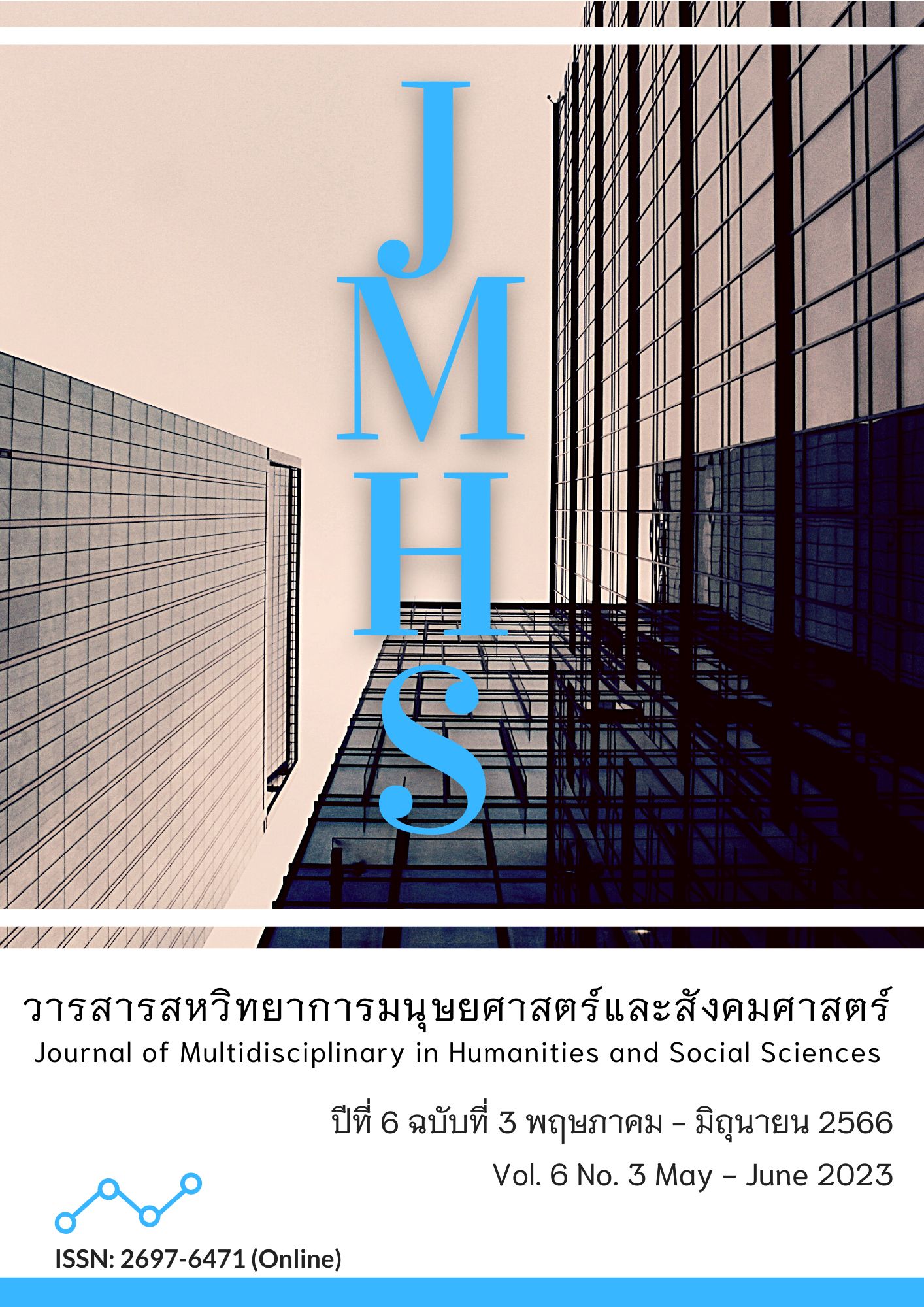Participatory Action Research to Develop Non-Formal Education Learning Process in Strengthening the Community Based on Social Capital: Case Study of Bangmafor Community, Nakhon Sawan Province.
Main Article Content
Abstract
This research aimed to: (1) study participatory action research to develop learning processes; and (2) present policy recommendations. It was a qualitative research project. A participatory action research framework was used as the research framework. The main informants consisted of people in the Bangmafor community who participated in learning activities. It focused on the field study, summarized the results analytically, and described them in detail. The research results were found as follows:
The development of the learning process through the making of Khao Chae, which was cultural capital and local tradition, was important social capital to drive the learning process and strengthen the community. There were 6 steps, as follows: 1) The community was aware of the problem. 2) It collectively analyzed and found the social capitals. 3) It helped formulate solutions. 4) There were exchanges of learning through the activities. 5) The community created new knowledge, and 6) it was transferred by integrating participatory action research at all stages, which made people in the community knowledgeable, self-reliant, and free to determine their own options for dealing with the problems. Groups were organized in the community to carry out various activities consistently and measurably. The knowledge that helps strengthen the community was passed on to the younger generations.
This research had three dimensions of policy recommendations as follows: 1) for the community by promoting community knowledge management; 2) for local government agencies by creating a community database; and 3) for other relevant government agencies by supporting the participation of civil society.
The finding resulted in an explicit knowledge of a learning cycle for self-development in the community after having an opportunity to participate in the learning process together, resulting in systematic collaboration and the discovery of the potential of the community, which helped develop its people to the fullest.
Article Details

This work is licensed under a Creative Commons Attribution-NonCommercial-NoDerivatives 4.0 International License.
Views and opinions appearing in the Journal it is the responsibility of the author of the article, and does not constitute the view and responsibility of the editorial team.
References
กรมการพัฒนาชุมชน. (2553). รายงานการวิจัยทิศทางการพัฒนาชุมชนไทยในอนาคต. กรุงเทพฯ: บีทีเอสเพรส.
เกรียงศักดิ์ เจริญวงศ์ศักดิ์. (2544). ชุมชนนิยม: ฝ่าวิกฤติชุมชนล่มสลาย. กรุงเทพฯ: ซัคเซสมีเดีย.
โกวิทย์ พวงงาม. (2553). การจัดการตนเองของชุมชนท้องถิ่น. กรุงเทพฯ: บพิธการพิมพ์.
จักรกฤษณ์ เจริญสิทธิ์ และคณะ. (2561). ทุนทางสังคมและการมีส่วนร่วมของชุมชน กรณีศึกษาการท่องเที่ยวโดยชุมชนบ้านผาหมอน อุทยานแห่งชาติดอยอินทนนท์ จังหวัดเชียงใหม่. วารสารวไลยอลงกรณ์ปริทัศน์ (มนุษยศาสตร์และสังคมศาสตร์), 8(1), 61-72.
ณดา จันทร์สม. (2565, พฤศจิกายน 29). ทุนทางสังคมกับการพัฒนาชุมชนอย่างยั่งยืน. สืบค้นจาก https://thaipublica.org/2022/11/nida-sustainable-move09
นภาภรณ์ หะวานนท์ และคณะ. (2550). ทฤษฎีฐานรากในเรื่องความเข้มแข็งชุมชน. กรุงเทพฯ: สำนักงานกองทุนสนับสนุนการวิจัย.
นิภาพรรณ เจนสันติกุล. (2564). กระบวนการเรียนรู้โดยใช้ชุมชนเป็นฐาน: บทสะท้อนจากประสบการณ์และการเรียนรู้. วารสารมนุษยศาสตร์และสังคมศาสตร์ มมร วิทยาเขตอีสาน, 2(3), 78-85.
ปาน กิมปี. (2554). ทุนทางสังคมกับการจัดการศึกษานอกระบบและการศึกษาตามอัธยาศัย. วารสาร กศน., 4(1), 34-37.
พระมหาจรูญ กิตฺติปญฺโญ และ จรัส ลีกา. (2564). การเสริมสร้างความเข้มแข็งแก่ชุมชนในยุคไทยแลนด์ 4.0 กรณีศึกษาชุมชนเข้มแข็งองค์การบริการส่วนตำบลหนองกุงธนสาร อำเภอภูเวียง จังหวัดขอนแก่น. วารสารบัณฑิตศึกษามหาจุฬาขอนแก่น, 8(1), 189-201.
พสุ เดชะรินทร์. (2563). การเรียนรู้ของผู้ใหญ่. กรุงเทพธุรกิจ. สืบค้นจาก https:bangkokbiznews.com/blogs/columnish/126012
ไพฑูรย์ สอนเนียม, ดารินทร์ นุชมอญ และ เวสารัชช์ คงคาน้อย. (2563). สัมภาษณ์, 16 มกราคม.
ไมตรี อินเตรียะ. (2560). ทุนทางสังคม. วารสารนาคบุตรปริทรรศน์, 9(2), 14-25.
สำนักงานสภาพัฒนาการเศรษฐกิจและสังคมแห่งชาติ. (2565). แผนพัฒนาเศรษฐกิจและสังคมแห่งชาติ ฉบับที่ 1-12. สืบค้นจาก http://nscr.nesdc.go.th/main.php?filename=develop_issue
สมยศ เกิดนิยม. (2563). นายกองค์การบริหารส่วนตำบลบางมะฝ่อ. สัมภาษณ์, 9 มกราคม.
สุภางค์ จันทวานิช. (2561). วิธีการวิจัยเชิงคุณภาพ. (พิมพ์ครั้งที่ 24). กรุงเทพฯ: จุฬาลงกรณ์มหาวิทยาลัย.
สุมาลี สังข์ศรี. (2557). แนวทางการจัดการศึกษาตามอัธยาศัยเพื่อส่งเสริมการศึกษาตลอดชีวิต. ในเอกสารการสอนชุดวิชาการศึกษาตลอดชีวิตและการศึกษานอกระบบ เล่มที่ 2 หน่วยที่ 14 สาขาวิชาศึกษาศาสตร์. นนทบุรี: โรงพิมพ์มหาวิทยาลัยสุโขทัยธรรมาธิราช.
สุวิธิดา จรุงเกียรติกุล. (2558). แนวทางการจัดการศึกษาตลอดชีวิตเพื่อขับเคลื่อนชุมชนการเรียนรู้ในบริบทสังคมและวัฒนธรรมของประเทศไทย. กรุงเทพฯ: คณะครุศาสตร์, จุฬาลงกรณ์มหาวิทยาลัย.
อาชัญญา รัตนอุบล. (2550). การจัดโปรแกรมการศึกษานอกระบบโรงเรียน. กรุงเทพฯ: คณะครุศาสตร์, จุฬาลงกรณ์มหาวิทยาลัย.
อุทัยทิพย์ เจี่ยวิวรรธน์กุล. (2553). การวิจัยเชิงปฏิบัติการแบบมีส่วนร่วม: แนวคิด หลักการ และบทเรียน. (พิมพ์ครั้งที่ 2). กรุงเทพฯ: พี.เอ.ลีฟวิ่ง.
Daniel, B., Schwier, R., & McCalla, G. (2003). Social Capital in Virtual Learning Communities and Distributed Communities of Practice. Canadian Journal of Learning and Technology, 29(3), 113-139.
McTaggart, R. (2000). Principles for Participatory Action Research. SAGE Journals, 41(3), 125-149.
Nelson, D. (2020, December 29). Participatory Action Research: A Literature Review. Retrieved November 15, 2022, from https://www.researchgate.net/publication/321398218.


